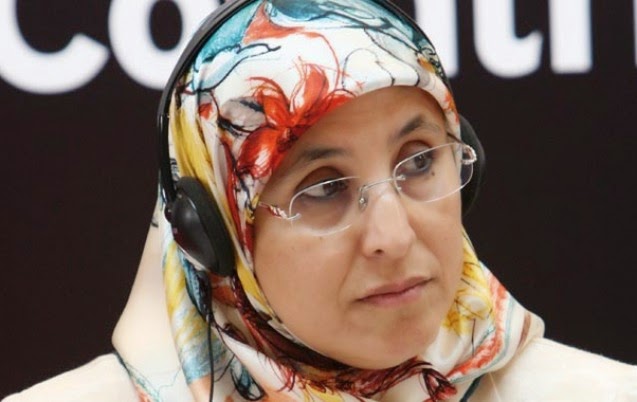Sunday March 8th is International Women's Day. In Morocco, the struggle for equality is taking centre stage, with the government turning its attention to several pieces of legislation that women's groups claim are long overdue. At the same time a major report by NGO's paints a troubling picture of just how much work remains to be done
Last Friday, Bassima Hakkaoui, Minister of Solidarity, Women, Family and Social Development, announced that "The bill for the creation of the National Forum of Parity and fight against all forms of discrimination will be presented on Thursday by the Government Council."
 |
| Bassima Hakkaoui |
The creation of this National Forum, as women's rights advocates point out, is stipulated in Article 19 of the Constitution which aims to establishes "equal rights" and urges the State to "strive for parity" through the establishment of a special body.
At the same time, a bill will be introduced to improve the fight against violence towards women. "We want to make a specific law for women, which will be launched by the end of this year," announced Mrs. Hakkaoui.
Mbarka Bouaida, Minister Delegate to the Minister of Foreign Affairs and Cooperation speaking at a conference debate on "women's rights in Morocco, 20 years after Beijing" jointly organised by the Ministry of Foreign Affairs and Cooperation and UN Women, added her voice to the debate, saying that the Kingdom "has consistently demonstrated an unwavering commitment to a pro-active approach to promoting women's empowerment and gender equality, by implementing structural reforms and by taking effective measures to strengthen the role of women in the construction of a modern society."
 |
| Mbarka Bouaida |
"If the reform of the Family Code has done justice to Moroccan women and strengthened its role within the family and society, the new 2011 Constitution paves the way for an effective fight against discrimination against women and the full enjoyment of their rights and freedoms," said Mbarka Bouaida.
Yet, a report on the situation of women's rights in Morocco describes an almost diametrically different situation. "In terms of women's rights, many reform projects are open since the adoption of the new constitution in 2011," reads the report, "but their execution is marked by inexplicable delays." Based on figures from the High Commission for Planning (HCP), the 38 organisations headed by the Democratic Association of Women of Morocco (ADFM), the report paints a damning assessment of the situation of Moroccan women, claiming that poverty, violence, unemployment and different types of discrimination are the daily lot of a large number of Moroccan women.
Despite the report, Bassima Hakkaoui remained optimistic, saying that Morocco's balance sheet is very positive, and that the country has recorded significant progress in equality making it a "leader in the region and internationally. We are pleased with the balance and ambitious to set up other accomplishments," she said.
 |
| Aatifa Timjerdine |
Between optimism and reality are the stark figures reported by the NGOs that indicate 62.8% of Moroccan women have suffered gender violence; 55% in the marital context. "Violence can be either physical or moral, through intimidating or hurtful words, " says NGO Coordinator, Aatifa Timjerdine. The report recommends a revision of the criminal law to meet three requirements, in accordance with Article 22 of the Constitution: the investigation of perpetrated violence, punishment of such violence and compensation for damages suffered by the victims.
The report also examines women's health issues and notes that there are still too many illegal abortions. Using data from the Moroccan Association against Illegal Abortion (Amlac) it estimates that 600 to 800 women have abortions every day in unsanitary conditions. The report proposes a revision of Article 453 of the Criminal Code to expand the circumstances under which a therapeutic abortion is permitted.
The report also reviews the situation of women regarding literacy and schooling. In 2012, the illiteracy rate among urban women was 47.6% against 25.3% for men. In rural areas, female illiteracy was as high as 64.5% in 2012.
In some parts of Morocco, 83% of brides are minors.
Disparities between rural and urban areas are more stark in secondary education. Net enrolment rate of rural girls in college is below 27.2% and drops to a rate of 7% in high school.
 |
| Women's protest in Rabat |
The report shows an increase in female employment, but notes that women are the most affected by unemployment (10.2% against 8.4% for men). In urban areas, the female unemployment rate is 24% while that of men is 17%. About 21% of women who hold diplomas of higher education remain unemployed, while the number of unemployed men in the same situation is only 11%.
The sectors where women work most are agriculture (61.1%), the services sector, 26.3% and industry, 12.5%.
Women's representation in the governing bodies of legislative, executive and judiciary, remains low. An HCP survey in 2012 shows that women are under-represented (24.2%) in positions of responsibility.
At the level of political participation parliament has only 67 women out of 395 members, 17% instead of 10.5% in the previous term. To break the "glass ceiling", the NGOs ask for the implementation of affirmative action to reduce disparities in access to positions in the public service.
SHARE THIS!


No comments:
Post a Comment